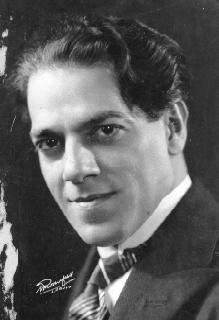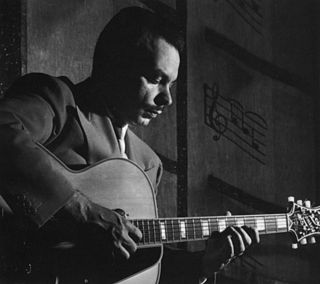
Heitor Villa-Lobos was a Brazilian composer, conductor, cellist, and classical guitarist described as "the single most significant creative figure in 20th-century Brazilian art music". Villa-Lobos has become the best-known South American composer of all time. A prolific composer, he wrote numerous orchestral, chamber, instrumental and vocal works, totaling over 2,000 works by his death in 1959. His music was influenced by both Brazilian folk music and stylistic elements from the European classical tradition, as exemplified by his Bachianas Brasileiras and his Chôros. His Etudes for classical guitar (1929) were dedicated to Andrés Segovia, while his 5 Preludes (1940) were dedicated to his spouse Arminda Neves d'Almeida, a.k.a. "Mindinha". Both are important works in the classical guitar repertory.
The 1st Annual Grammy Awards were held on May 4, 1959. They recognized musical accomplishments by performers for the year 1958. Two separate ceremonies were held simultaneously on the same day: one in the Beverly Hilton Hotel in Beverly Hills, California, and the other in the Park Sheraton Hotel in New York City. Ella Fitzgerald, Count Basie, Domenico Modugno, Ross Bagdasarian, and Henry Mancini, each won 2 awards.
The 3rd Annual Grammy Awards were held on April 12, 1961, at Los Angeles and New York. They recognized musical accomplishments by the performers for the year 1960. Ray Charles won four awards and Bob Newhart and Henry Mancini each won three awards.

Sharon Isbin is an American classical guitarist and the founding director of the guitar department at the Juilliard School.
The 4th Annual Grammy Awards were held on May 29, 1962, at Chicago, Los Angeles and New York. They recognized accomplishments by musicians from the year 1961. Henry Mancini won 5 awards.
Salli C. Terri was a singer, arranger, recording artist, and composer. Record audiences still cite Terri's "haunting" vocals, with Hi-Fi Review originally describing her as "a mezzo soprano whose velvet voice and astonishing flexibility has hardly an equal at present."
Spanish guitar may refer to:
Gilmour's Albums was one of the longest-running radio shows on CBC Radio, and was hosted by former newspaper reporter Clyde Gilmour.

Joan Baez/5 is the fifth solo album and third studio album by American folk singer Joan Baez, released in October 1964. It peaked at number 12 on the Billboard 200 chart. The single "There But for Fortune" reached number 50 on the Billboard Hot 100 in the U.S. and became a top-ten single in the UK.

Canciones de mi padre is American singer Linda Ronstadt's first album of Mexican traditional Mariachi music.

Laurindo Jose de Araujo Almeida Nobrega Neto, popularly known as, Laurindo Almeida was a Brazilian guitarist and composer in classical, jazz, and Latin music. He was one of the pioneers in the creation of bossa nova. Almeida was the first guitarist to receive Grammy Awards for both classical and jazz performances. His discography encompasses more than a hundred recordings over five decades.

Sérgio Assad is a Brazilian guitarist, composer, and arranger who often performs with his brother, Odair, in the guitar duo Sérgio and Odair Assad, commonly referred to as the Assad Brothers or Duo Assad. Their younger sister Badi is also a guitarist. Assad is the father of composer/singer/pianist Clarice Assad. He is married to Angela Olinto.
The Bachianas Brasileiras are a series of nine suites by the Brazilian composer Heitor Villa-Lobos, written for various combinations of instruments and voices between 1930 and 1945. They represent a fusion of Brazilian folk and popular music on the one hand and the style of Johann Sebastian Bach on the other, as an attempt to freely adapt a number of Baroque harmonic and contrapuntal procedures to Brazilian music. Most of the movements in each suite have two titles: one "Bachian", the other Brazilian.

Alegría is a studio album by saxophonist Wayne Shorter, released on Verve Records in 2003. It is the second album to feature the 'Footprints Quartet' of Shorter, pianist Danilo Pérez, bassist John Patitucci and drummer Brian Blade.

Duets with the Spanish Guitar, Vol. 2 is an album by the Brazilian guitarist Laurindo Almeida, with violist Virginia Majewski and French Horn player Vincent DeRosa. It was originally released by Capitol Records in 1962 with the title The Intimate Bach.

Olé is a Latin American album by American pop singer Johnny Mathis that was released by Mercury Records in November 1964 and includes Spanish-language versions of English-language chart hits by Frank Sinatra ("Granada") and Sarah Vaughan ("Serenata") as well as the signature song of the I Love Lucy character Ricky Ricardo that was played by Desi Arnaz ("Babalu").

Robert Earl Myers Jr., also known as Bob Myers, was an American classical music record producer and artists & repertoire specialist. Myers spent most of his career at Capitol Records and the classical music division of its EMI parent company, Angel Records. During his early years with Capitol Records, Myers produced Grammy Award winning classical albums. In his later career, Myers led the Angel label in the United States, which included responsibility for all business and artist and repertoire decisions.

Chôros No. 11 is a work for piano and orchestra written in 1928 by the Brazilian composer Heitor Villa-Lobos. It is part of a series of fourteen numbered compositions collectively titled Chôros, ranging from solos for guitar and for piano up to works scored for soloist or chorus with orchestra or multiple orchestras. Chôros No. 11 is the longest in the series, a performance lasting over an hour.

Chôros No. 9 is an orchestral work written between 1929 and 1942 by the Brazilian composer Heitor Villa-Lobos. It is part of a series of fourteen numbered compositions collectively titled Chôros, ranging from solos for guitar and for piano up to works scored for soloist or chorus with orchestra or multiple orchestras, and in duration up to over an hour. A recorded performance of Chôros No. 9 made by the composer lasts almost 28 minutes.

Chôros No. 6 is an orchestral work written between 1925 and 1942 by the Brazilian composer Heitor Villa-Lobos. It is part of a series of fourteen numbered compositions collectively titled Chôros, ranging from solos for guitar and for piano up to works scored for soloist or chorus with orchestra or multiple orchestras, and in duration up to over an hour. Chôros No. 6 is one of the longer compositions in the series, lasting about 25 minutes in performance.












